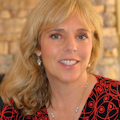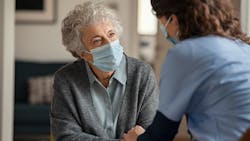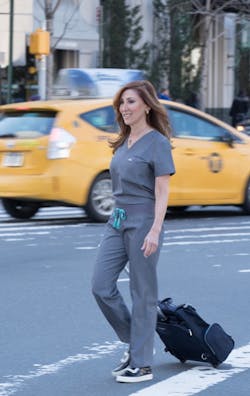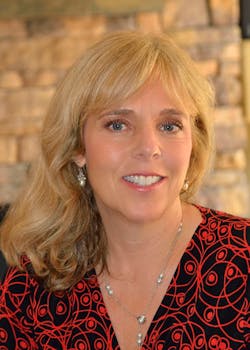House calls for the homebound: A compelling practice model
An 88-year-old woman with advanced Alzheimer’s disease has cracked a tooth. She is in pain and needs to see a dentist right away. She has been housebound for more than two years and requires round-the-clock help with activities of daily living. She is anxious, unpredictable, and known to scream if she feels threatened. Getting her up, out, and into a cab, let alone having her sit cooperatively in a dental chair, is not in the realm of possibility.
An 82-year-old gentleman with Parkinson’s disease has an infected tooth and urgently needs to have it pulled. Besides hand tremors, muscle rigidity, and impaired balance, he suffers from anxiety, depression, and cognitive decline. With great effort, his daughter could get him to a dental office, but he needs more time than most dentists’ schedules allow.
In conventional dental practices, healthy geriatric patients often require more time and patience than their younger counterparts. As many will attest, geriatric patients with physical, neurological, and cognitive challenges require a superhero.
Meet geriatric dentist, Dr. Alisa Kauffman
Dr. Kauffman, a 1985 graduate of the University of Pennsylvania, left private practice in 1998 to become a full-time house call dentist. She recalls, “I worked for other people for a few years and had my own practice for several years. I was successful enough but not always personally and professionally satisfied.” One snowy winter day when patients were cancelling, the rent was due, and Dr. Kauffman was lamenting how little time she had to spend with family, she had an epiphany. “In that moment, I made the decision to leave the overhead, overwork, staffing issues, time constraints, and undue stress behind. I decided to take my act on the road, so to speak, and become a house call dentist for homebound geriatric patients.”
As fortune would have it, a pregnant woman knocked on Dr. Kauffman’s office door and asserted, “I want to buy your practice.” She was an associate doctor looking to purchase an established practice where she could bring her baby to work. “She was wonderful and we were philosophically aligned.” Dr. Kauffman agreed to stay for a three-month transition. “The sale was easy and smooth. Had we met years earlier, we might have been business partners.” It is remarkable how the right people show up at the right time when you fully commit to an idea or goal. Dr. Kauffman had a vision of how she wanted to live and practice, and with the right buyer in place, her idea was coming to fruition.
“I worked in more than 20 nursing homes throughout my career, so I’ve always interacted with geriatric patients. They are so interesting. They make me laugh, I make them laugh, and since switching to house calls, the appreciation and gratitude I receive from these patients, their families, and caregivers is unmatched.” Dr. Kauffman, who now works as much or as little as she wants, says, “I get to spend more quality time with my daughter and feel less overall stress.” She drives to her destinations and typically sees between four to six patients a day. “It is financially lucrative to practice this way. I get paid at the time of visit and fill out forms for patient reimbursement.” Dr. Kauffman notes most geriatric patients don’t have dental insurance, and she hopes Medicare will eventually cover house call dentistry so more geriatric patients can have access to oral care. For now, house call dentistry is mostly a cash business.
House call dentistry is not the same as mobile dentistry. Mobile dentists arrive on site with an RV into which they take patients for treatment. Dr. Kauffman arrives with a roller bag stocked with dental equipment and enters patients’ homes. She affirms, “It is more personal, and I can give them the time they need. I believe geriatric patients should have someone treating them one-on-one in the most comfortable surroundings where their dignity and privacy are best preserved.” If you prefer a one-on-one relationship with a few good patients, read on.
Is house call dentistry for you?
House call dentistry is a great practice model for many dentists. According to Dr. Kauffman, “It can be the perfect fit for someone coming right out of residency who does not want to borrow funds for a brick-and-mortar office or for someone who does not know where they want to live long term.” She also finds it a great practice model for those wanting to practice part-time and spend more time with their families. Retiring dentists might find the flexible hours and part-time work sufficiently attractive to extend their careers or transition to retirement. According to Dr. Kauffman, “Many of the elderly simply wish to remain in their own homes rather than move to a group care facility. In-home services such as nursing, meal preparation, cleaning, and personal financial management are available fromDr. Kauffman is quick to acknowledge the benefits of having a proper dental chair, a dental assistant, and all the dental equipment found in a traditional practice setting. “If you can go to the dentist, you should go to the dentist, but not everybody is able to; not every patient can sit quietly without causing a commotion while waiting in-office for their appointment.”
Part of the growing demand for house call dentists is the rise in neurodegenerative diseases and the cognitive and motor deficits they impose. Dr. Kauffman is affiliated with a startup company called Willo, creators of an automated toothbrushing system. “This little ‘robot’ is exactly what my patients need. It does the work of a toothbrush without their having to position or move the bristles. It is brilliant!” Some of Dr. Kauffman’s patients cannot open their mouths or keep them open. To help patients with Alzheimer’s, Parkinson’s, ALS, and various forms of dementia, she developed an instrument to help patients keep their mouths open during procedures. “You learn to be resourceful when you do house calls,” she says.
Being resourceful is not the only trait necessary for working with geriatric patients in their homes. “If you are kind, patient, and compassionate, and you pride yourself on being quick on your feet and able to think outside of the box, geriatric house call dentistry may be for you.” Dr. Kauffman says it also helps to have good improvisational skills and a sense of humor. Since dementia patients can be wary and suspicious of strangers, it may be challenging to establish rapport. A first step is to break the ice and gain patients’ trust. “If I tell them I am a friend of their daughter’s, they quickly go from being suspicious and guarded to being relaxed and at ease. They love it when I say I went to school with one of their kids and mention them by name, and that we had the same friends and teachers and graduated together. Then we’re up and running, and I can get my work done.”
Dr. Kauffman can do most dental procedures on site. However, complex surgical excisions, root canals, new crowns, and cosmetic procedures are best done in an office setting. “There is so much you can do!” she enthuses. On any given day, she extracts teeth and root tips, makes dentures and partials, provides hygiene and maintenance services, applies fluoride treatments, including silver diamine fluoride (SDF), and more. She advises, “You have to be steady, confident, and organized, and you have to stay calm.” Taking a comprehensive history and knowing what medications the patient is taking are important. House call dentists need to work closely with patients’ primary care doctors and have a good working relationship with a trusted dental lab. Dr. Kauffman emphasizes, “Experience is the greatest teacher. You must give yourself time to learn what you need to know.”
Patient education
While there is much to learn, there is also much to teach. Besides instructing patients, Dr. Kauffman educates caregivers on effective oral care practices. “When you teach caregivers the proper way to get below the gumline while brushing, they are more likely to do a thorough job with their patients.” She is generous with her teaching tools; she comes equipped with quality toothbrushes and full-sized samples of her favorite oral care products. “I tell the patients right off I have ‘presents’ for them. Then I dispense these little goodies to everyone there. I bring GUM toothbrushes from Sunstar, which are proven to get under the gumline.” Dr. Kauffman knows that compliance and follow-through begin with hands-on instruction, and everything she teaches becomes a fun activity. Additionally, she gives the caregivers samples of the toothpaste and oral rinse she wants them to use on her patients, “otherwise they might go out and buy something inferior or too harsh for geriatric patients.”
“I’m a products person. I’ve tried just about everything on the market, and I prefer the CloSYS products. I use them personally and professionally, but since not everyone knows about them, I try to share some useful knowledge.” CloSYS is a line of oral care products designed to gently and effectively reduce the burden of harmful oral pathogens. Low in abrasiveness and pH balanced, the combination of toothpaste and oral rinse removes plaque, reduces oral malodor, alleviates dry mouth, prevents cavities, and strengthens the enamel.
“CloSYS Silver toothpaste and oral rinse are designed for patients 55 and older. They do not contain any dyes, alcohol, or sulfates. Geriatric patients generally don’t like the foamy sensation created by the addition of sulfates, and they often have a hard time expectorating foamy toothpaste. The CloSYS products are easy for them; no foam to spit out and no burning or irritation of tissues after a dental procedure. Actually, the rinse facilitates the healing process.” Dr. Kauffman does not use an oral rinse with patients who might swallow it. In those cases, she simply brushes the rinse onto patients’ teeth, gums, and tongue. Many geriatric patients have few teeth and limited ability to brush. Fortunately, CloSYS also offers an oral spray proven effective in clinical trials with geriatric patients.
House call dentistry benefits the dentist, too
House call dentistry offers numerous benefits for dental practitioners. “You can have a financially rewarding practice with zero overhead and no staff to hire or fire; a practice where patients are never late, don’t cancel, and are always appreciative,” Dr. Kauffman explains. Initial start-up costs are approximately $20,000, including the purchase of a Bluetooth x-ray capable of sending images to a cell phone. “I love my Genoray portable unit; it’s small, light, and easy to use, and it produces quality images I can rely on.”
Besides the financial rewards, the flexible work schedule is an attractive feature of this practice model. “You can work one day a week or a couple of hours a day five days a week. One thing is certain; you’ll never have to miss an important event in your child’s life,” she assures. For those in the latter stages of their career, house call dentistry means continuing to make a meaningful contribution while pursuing one’s own interests and pleasures.
Geriatric patients unable to leave their homes derive immeasurable benefit from personalized home care. Having clean teeth and an oral cavity free of infection, pain, and swelling affords geriatric patients a better quality of life at a time they are unduly challenged. “One of the last real pleasures in life is to eat food you enjoy, to sink your teeth into something delicious and chew it without pain or incident,” Dr. Kauffman says.
A 91-year-old woman on hospice care is suffering with painful oral lesions, making it impossible for her to eat. An ambulance or medical transport to a dental office is contraindicated given her weakened and impoverished state.
You are new to house call dentistry. You arrive on site and are greeted by the patient’s family with grateful smiles of relief. Equipped with the right tools, the best products, skilled hands, and a loving heart, it is hard to determine if it is you or the patient who benefits most. Welcome to the joys of geriatric house call dentistry, a new model for practice management.
Editor's note: This article appeared in the September 2021 print edition of Dental Economics.
About the Author

Alisa Cooper, DC
Alisa Cooper, DC, is a chiropractor, clinical nutritionist, and wellness coach helping others achieve and maintain optimal health and wellbeing for over 25 years in clinical practice. As a passionate educator and health advocate, she writes and speaks on a sundry of topics and trends in health care today.
Updated August 6, 2021


